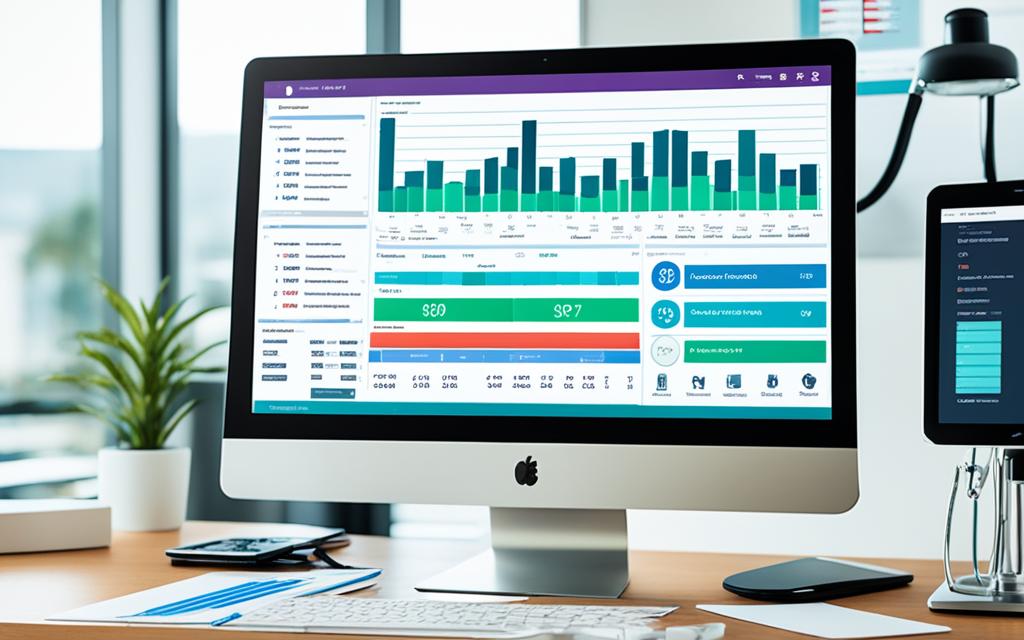More than 70% of small US healthcare providers are turning to ERP (Enterprise Resource Planning) systems. This trend showcases the essential role of healthcare technology solutions. They boost efficiency and better patient care. Renowned platforms like Epic, Cerner, and WebPT impact healthcare hugely. They serve over 250 million patients worldwide.
Small healthcare providers need to keep up with competition. Efficient healthcare information management is critical for them. These healthcare software solutions streamline electronic health records and billing. They also make staff scheduling better. With cloud-based healthcare ERP, data is in one place. This makes decision-making and following HIPAA and FDA rules easier.
Key Takeaways
- Over 70% of small healthcare providers in the US are adopting ERP systems.
- ERP systems enhance operational efficiency by centralizing healthcare data.
- Renowned healthcare ERP platforms, including Epic and Cerner, serve over 250 million patients globally.
- Small healthcare providers benefit from improved electronic health records system management, billing processes, and staff scheduling.
- HIPAA compliant ERP solutions help ensure adherence to healthcare regulations.
Introduction to Healthcare ERP Systems
Healthcare ERP systems integrate core business tasks for the healthcare field. They manage finances, buying, staff, and patient care, among other things. Let’s explore healthcare ERP and its importance for small healthcare providers.
What is Healthcare ERP?
Healthcare ERP stands for Enterprise Resource Planning. It’s software that helps manage healthcare institutions’ key operations. It follows laws like HIPAA and keeps patient data safe. By working with other systems, healthcare ERP improves patient care and data sharing.
Why Small Healthcare Providers Need ERP
Small healthcare providers face issues like limited resources and the need for efficient work. ERP systems, like hospital or medical practice management software, help a lot. These systems aid with billing, keep patient data safe, and manage resources better. Companies such as SAP, Oracle, Workday, and Netsuite provide these solutions.
This ensures small healthcare providers operate well and give excellent patient care. A good healthcare data integration platform connects different systems smoothly.
Key Features of Healthcare ERP for Small Practices
In the busy world of healthcare, a good ERP system is key for small practices. It makes different areas like management work better and helps patients too. This way, everything runs smoothly and patients get better care.

Patient Data Management
Good care starts with keeping *patient data* safe and easy to use. Healthcare ERPs help keep patient info, insurance details, and billing safe. They follow the rules and build trust with patients. With *EMR* features, doctors can see patient histories easily to make good care choices.
Financial Management
Small practices need to keep their finances right. Healthcare ERPs help with *medical billing* and keeping the books right. They make sure money matters are correct and reduce mistakes. This helps the practice stay financially healthy.
Clinical Workflow Optimization
Making clinical work efficient is key for good healthcare. Healthcare ERPs have tools to help with scheduling, using resources well, and making good care choices. They keep everything running well so doctors can focus on caring for their patients. Adding *practice management ERP* improves how clinical and admin tasks work together.
| Key Features | Benefits |
|---|---|
| Patient Data Management | Secure records, compliance, improved patient trust |
| Financial Management | Streamlined billing, accurate invoicing, financial health |
| Clinical Workflow Optimization | Efficient scheduling, resource allocation, high-quality care |
Benefits of Implementing Healthcare ERP in Small Healthcare Providers
Small healthcare providers gain a lot from healthcare ERP systems. These systems make managing healthcare information easier. They help with better decisions in clinical and administrative areas.
Enhanced Data Integration
Healthcare ERP modules improve data sharing. They put all patient info in one place. This makes it easy for healthcare professionals to get and use patient data smoothly.
This leads to a complete view of a patient’s care. It supports smart decision-making. Easy access to health records, treatment options, and billing systems boosts work efficiency.
Improved Patient Care
ERP systems help small healthcare places better patient care. They make it easier to keep up with medical records, medication, and treatment plans. Staff can then spend more time with patients, giving personalized care.
This enhances how healthcare teams work together. It improves processes and patient experiences.

Choosing the Right Healthcare ERP: Factors to Consider
When picking a healthcare ERP for small places, think about scalability, customization, and budget. It’s important to find a system that grows with your practice but stays affordable. This balances meeting needs now and in the future while keeping costs in check.
Scalability and Customization
It’s key to choose a healthcare ERP that can handle more patients as your practice grows. The system should also integrate new features smoothly. Plus, it must adapt to your specific workflow. This makes sure the system boosts efficiency and meets your operational needs well.
Cost and Budget Considerations
Budget matters a lot in tech decisions. The price of healthcare ERP systems for small practices can differ a lot. It depends on the provider, practice size, system complexity, and how much you customize it. You need to think about all costs like initial fees, setup, and ongoing support. Comparing these costs with the benefits helps you choose wisely. It leads to picking an ERP that helps for a long time without breaking the bank.
Top Healthcare ERP Systems for Small Healthcare Providers
When we look at the top healthcare ERP solutions for small providers, several names stand out. They offer many functions and are well-known in the field.
Acumatica is great because it makes operations clear and helps manage money well. It shines in our healthcare erp comparison due to its financial control and easy interface.
ERPNext is another great choice. It’s awesome for booking patients and tracking data clearly. Its easy-to-use system is perfect for small practices that need a simple hospital management system.
Infor stands out for its strong ERP features and extra tools. These are great for finances and managing supplies in healthcare. It works well with other systems, making it important in our erp system rankings.
Microsoft Dynamics 365 aims to make patient care better through its healthcare features. It has customizable options to fit the unique needs of small providers.
Last, Unit4 is known for keeping patient data safe and cutting system costs. This platform is known for its security and saving money.
| ERP System | Key Functionality | Highlights |
|---|---|---|
| Acumatica | Operational Visibility & Budget Management | Robust financial oversight and clear UI |
| ERPNext | Patient Appointment Management & Data Tracking | User-friendly design, intuitive for small practices |
| Infor | Healthcare Financials & Supply Chain Management | Seamless integration with existing infrastructure |
| Microsoft Dynamics 365 | Integrated Healthcare Functionalities | Enhances patient experiences, customizable features |
| Unit4 | Secure Patient Data Management | Cost-efficient, strong security features |
These top healthcare ERP solutions stand out for small providers. They help improve patient care or make finances stable. Each has solutions perfect for a healthcare erp comparison.
Conclusion
As we wrap up our review, picking the right ERP system is key for small health providers in the US. The best ERP system can boost efficiency, improve clinical workflows, and make sure rules are followed. For small practices wanting to stand out, using the best health tech is crucial to offer top care.
Looking for the top health tech solutions shows that the right management software is a must, not just a nice-to-have. Small health providers should look for systems that grow with them, can be made to fit, and are affordable. They must choose wisely, focusing on the benefits and features of each system, to find one that underpins their work well.
A good ERP system enhances patient experiences, joins different health processes, and leads to better health management. As health care gets more advanced, the tech that supports it must also get better. Choosing the right ERP is a smart move for small practices, helping them stay ahead in the changing US health landscape.

